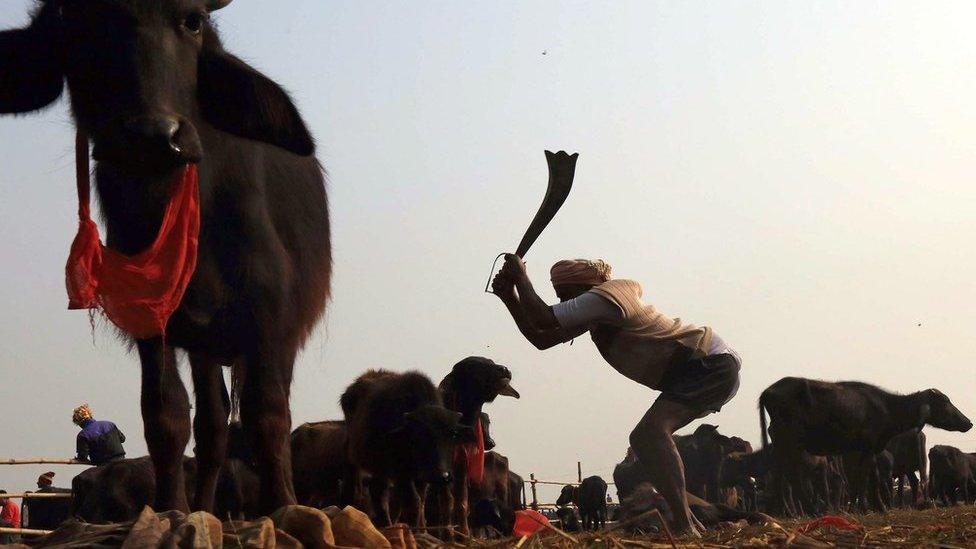Did Nepal temple ban animal sacrifices at Gadhimai festival?
- Published
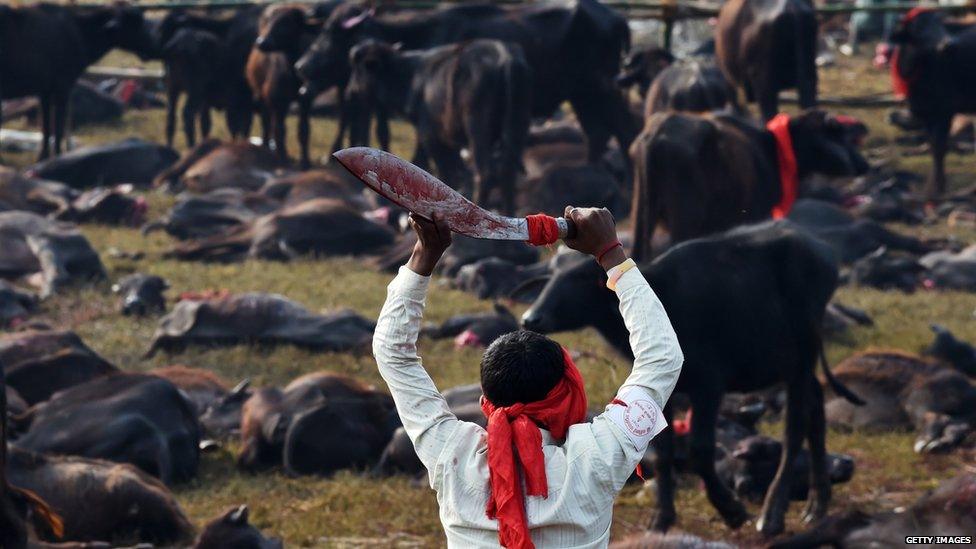
News was reported around the world on Tuesday that one of the world's bloodiest religious ceremonies was being ended.
The festival at the Hindu temple in Bariyarpur in Nepal sees tens of thousands of animals sacrificed to the goddess Gadhimai, and always provokes international outrage.
The announcement that sacrifices were now banned was greeted with delight by animal activists - but then the temple's chairman said it was not true. So what happened?

What happens at the Gadhimai festival?
Every five years, Hindu pilgrims from Nepal and India buy animals ranging from buffalo to rats, and bring them to be sacrificed at the temple in Bara district.
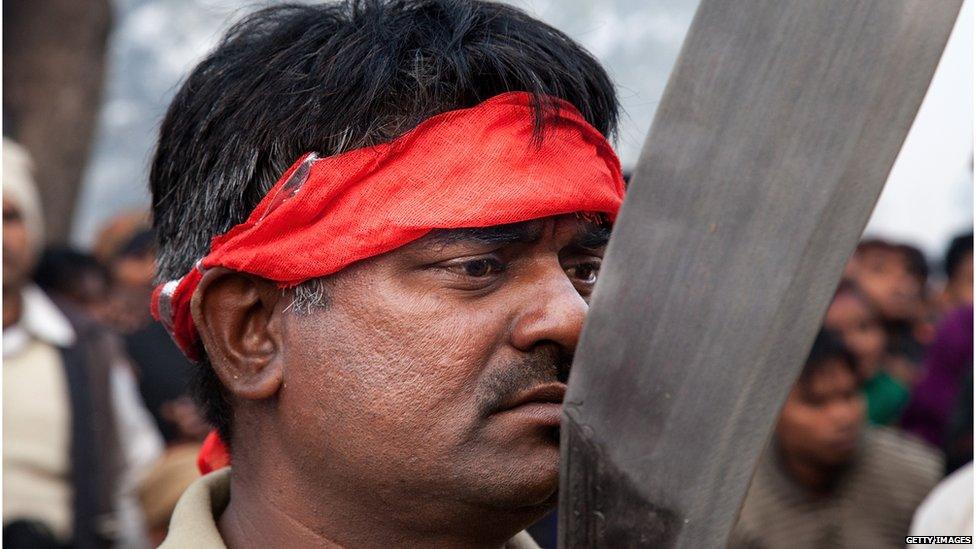
Over several days of gore, thousands of buffalo and tens of thousands of smaller animals are killed, either by priests in the temple or by others in the surrounding fields.
The tradition dates back to a priest who was told about 250 years ago in a dream that spilled blood would encourage Gadhimai, the Hindu goddess of power, to free him from prison.
What did the charities say?
"Victory! Animal sacrifice banned at Nepal's Gadhimai festival, half a million animals saved," said the press release, external from Humane Society International (HSI) and Animal Welfare Network Nepal (AWNN).
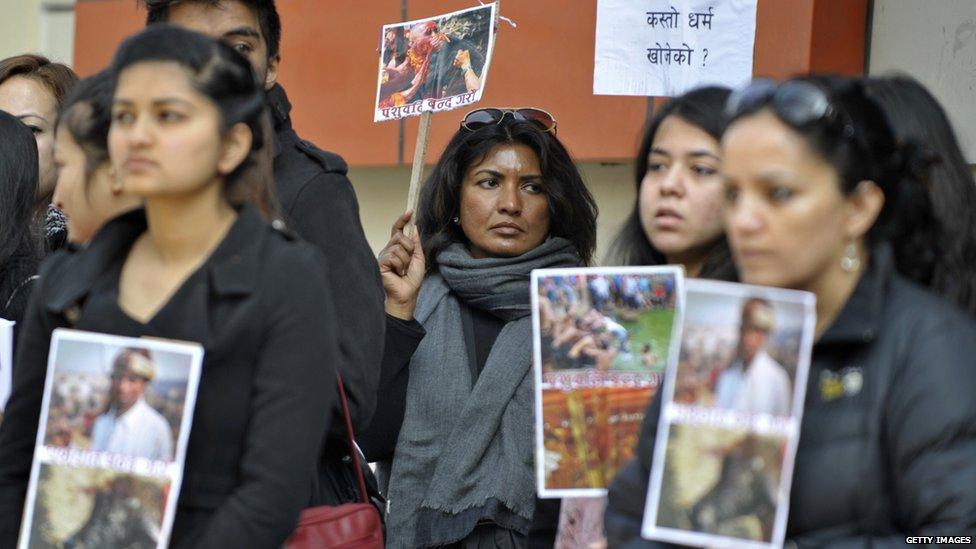
The festival always generates protests, both in Nepal and abroad
After "rigorous negotiations", the temple agreed to "cancel all future animal sacrifice" and would "[urge] devotees not to bring animals to the festival", they said.
They quoted the chairman of the Gadhimai Temple Management and Development Committee, Ram Chandra Shah, as saying: "The time has come to replace killing and violence with peaceful worship and celebration."
The charities held news conferences in Delhi and in Bihar - where most of the sacrificial animals originate - with four key members of the temple committee, including the chief priest, though not Mr Shah.
Motilal Prasad, secretary of the temple trust, confirmed to AFP news agency: "We have decided to completely stop the practice of animal sacrifice," he said. "I realised that animals are so much like us... and feel the same pain we do."
How did the temple chairman respond?
Then Ram Chandra Shah, the man quoted by the charities, said flat out that the ban was not true.
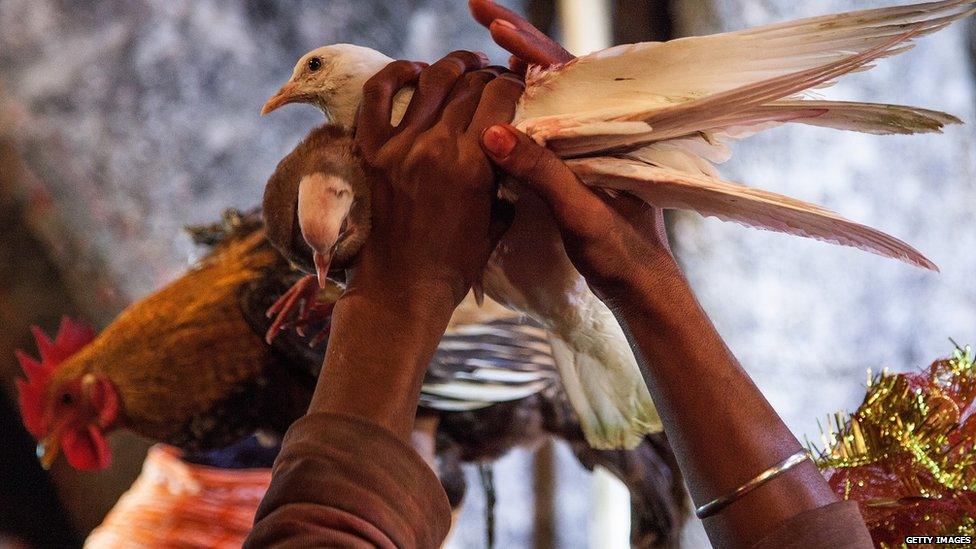
The temple chairman said people could not be forced to abandon sacrifices
"Devout Hindus could be requested not to offer animal sacrifice to the goddess, but they could not be forced not to do so - nor [could] the tradition be banned or stopped completely," he told the BBC.
It was not clear whether he denied giving the statement used by the charity, but he said the quotes from other officials had been taken out of context.
While he had "no objections" to the campaign against the sacrifices, "if people don't heed, we can't do anything about it".
"Nothing will change as far as the tradition of offering animal sacrifice during the festival is concerned. Things will not change no matter what the four [in the delegation] do or say. It's our age-old tradition," he said.
What did the charities say to that?
HSI spokeswoman Navamita Mukherjee said she was "surprised and confused" by Ram Chandra Shah's comments. The ban was true, she told the BBC. "Why would we organise a press conference on such a large scale to announce such a move" if it wasn't true, she said.
Another HSI spokeswoman, Alok, who was in Bihar with the temple officials, said the statement quoting Mr Shah "is definitely from him".
"We have the priests and the rest of the temple here," she said, all ready to promote the no-sacrifice rule to future festival pilgrims.
"There might be a misunderstanding - they might think we're implying that the entire festival is over but it's only the animal sacrifice."
Manoj Gautam, president of AWNN who was also in Bihar, said the temple had agreed outright to end their involvement in the killing inside the temple, and to dissuade others from "spontaneous" sacrifices outside.
The support of the chief priest - a direct descendant of the festival's founder - was key, he said. "Just a year ago he was a very proud supporter, but now he despises it and vowed to take a step forward on this matter."
"Without him sacrificing the animals, it cannot be done," he said, which would promote the view that a sacrifice is not expected.
He said the charities had been carefully campaigning against the festival for years, but that neither they nor the temple had wanted to risk resentment by issuing a ban before they had public support.
Are temple board members split on the issue?
Tripurari Shah, a member of the temple board, denied that temple trust members were divided.
"There's no rift. I think what [Ram Chandra] Shah is trying to say is that we have millions of devotees. We have to reach out to them and make them aware," he told the BBC.
The temple was campaigning to stop animal sacrifices, and he believed that the "2019 festival will be blood-free".
What does this mean for the next festival?
Mr Gautam said the slaughter tradition had been dying out anyway in recent years, with a huge drop in the number of animals killed, and the charities would spend the next four years working with the temple to ensure the 2019 gathering would be "completely bloodless".
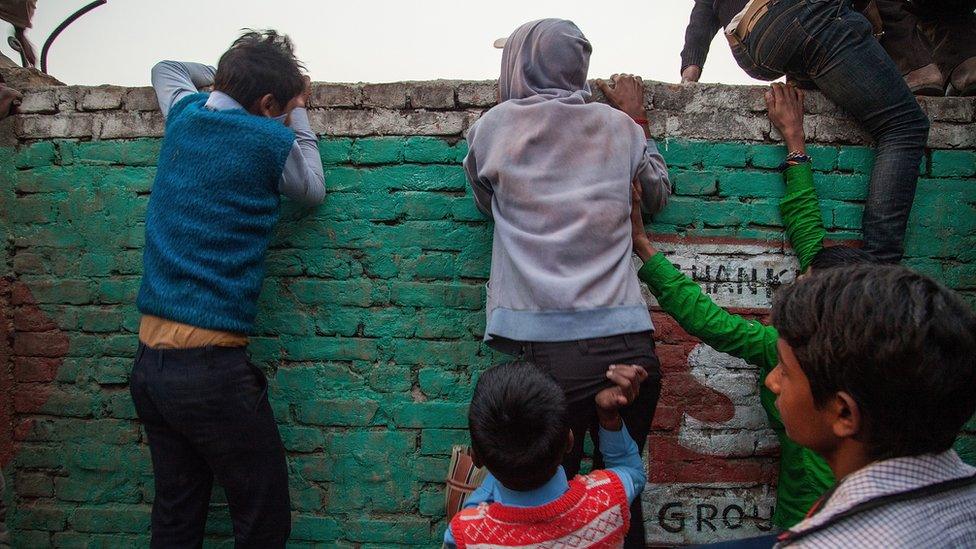
The charities said the festivals could be more family friendly
"We don't oppose the festival," he said, but there was no reason people couldn't bring pumpkins or fruit, making it "a grand celebration of life itself ", as well as a boost to tourism.
But many in southern Nepal have a deep-rooted belief and faith associated with the festival, and feel the tradition is unlikely to stop anytime soon.
Reporting by Anna Jones, Surendra Phuyal and Geeta Pandey
- Published28 November 2014
